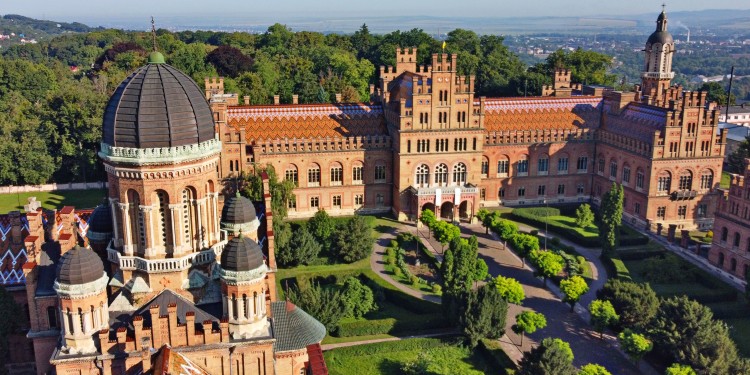
More than just an act of solidarity
There are fundamentally more important issues which people at Ukrainian universities are currently concerned about than research, studies and exchanges. However, combined with their hopes of an end to this war of aggression is their desire to shape the future. The University of Münster is intensifying its cooperation with Ukraine’s Yuriy Fedkovych National University in Chernivtsi, and a Memorandum of Understanding has already been signed between the two. Prof. Irina Wutsdorff, the managing director of the Institute of Slavic Studies at Münster University, would like this also to be seen as an “act of solidarity”. As the new director of the Institute, she is not only continuing existing cooperations with Polish and Baltic universities but is also entering into partnerships in the Czech Republic and, as stated, Ukraine. “The war played a key role,” she says, “and we want to take a stand.”
This is not the only reason by any means. As Dr. Anke Kohl, Head of Münster’s International Office, explains: “We would have expanded this partnership even without the war. There have been contacts with other Departments for quite some while now, and now there is also this additional interest from the Institute of Slavic Studies.” Initiating and implementing this joint agreement involves the same process as other cooperations, Kohl says, but now, especially, it is particularly important “not to allow academic contacts to be broken off but, rather, to promote them.” This feeling was reciprocated in the International Office at Chernivtsi. “We were delighted at the interest shown by the University of Münster,” says Oxana Matiychuk, who is also active in the ‘Gedankendach’ Centre for Culture and Science. There are many overlaps, she says, as well as fields of research which have achieved prominence as a result of the war, such as conflict, migration, identity and environmental studies.
The Institute of Slavic Studies at the University of Münster is in the process of being relaunched, with a new bachelor course in Slavic Studies beginning in the winter semester. This is why Irina Wutsdorff – who is actively involved in support for refugees from, and for supplying aid to, Ukraine – hopes that students will benefit from the partnership. “After this war has ended, which will hopefully be soon, the opportunity for students to spend part of their course in Chernivtsi and gain experience abroad there will benefit them enormously,” she says.
A key role is played not only by student exchanges but also by research. It is not only at the Institute of Slavic Studies that the research activities at the University of Chernivtsi are held in high regard; there are also points of contact in the fields of Eastern European and Central European History and Jewish Studies. The National University is very active in research into the German-Jewish past in the region of Bukovina,” says Irina Wutsdorff. In fact, she adds, Ukraine in history and in the present is a subject for research which calls out for the application and further development of contemporary methods of research. “The country is characterized by diversity – from a linguistic, literary, cultural and historical point of view. This refers not only to Ukrainian and Russian elements but also to historical links with Polish and with German and Yiddish culture. Ukrainian Studies is much more than the national philology of a nation which was established late. It is a very good example of a field of studies suitable for researchers from the Humanities and the Social Sciences who are interested in transnational and intercultural phenomena and the historical links involved. Research is as close to Irina Wutsdorff’s heart as her appeal to maintain aid for Ukraine. “Donations are still urgently needed – for example, by the aid for Bukovina being organised by the ‘Gedankendach’ Centre,” she says.
Author: Hanna Dieckmann
This article first appeared in the University newspaper wissen|leben Nr. 4, May 3rd 2023.
